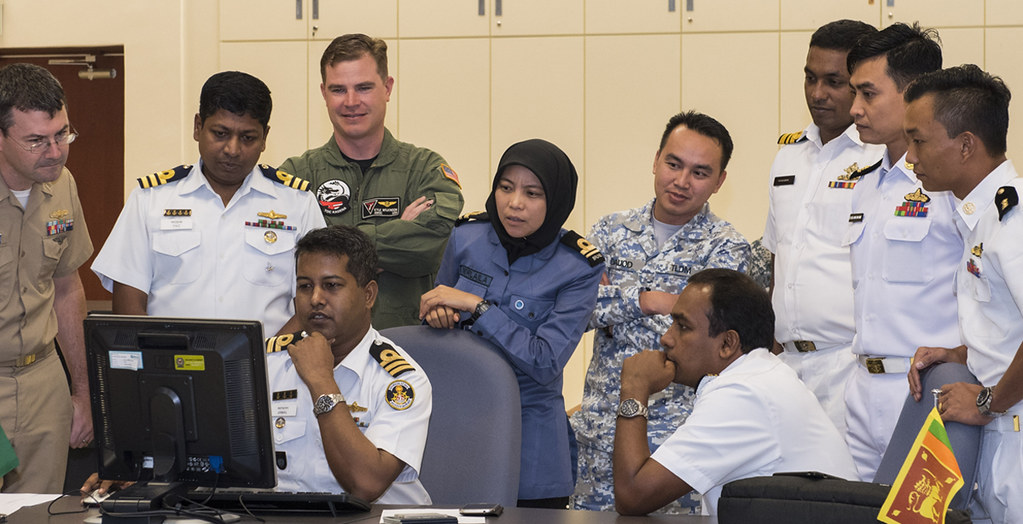From Task Force 73 Public Affairs
Liaison officers coordinate exercise activities during SEACAT, Aug. 28 at Changi Naval Base in Singapore. (U.S. Navy/MC2 Joshua Fulton) >>
SINGAPORE - The 16th annual Southeast Asia Cooperation and Training (SEACAT) exercise commenced Aug. 21 in Singapore, Brunei, and the Philippines, focusing on shared maritime security challenges of the region.
The goal of the exercise, which continues through Sept. 1, is to increase multilateral cooperation and information sharing among navies and coast guards across South and Southeast Asia. The exercise will continue through Sept 1.
"SEACAT brings nations together for meaningful dialogue, knowledge sharing, and practical training to address common challenges of piracy, sea smuggling, and other illegal activities at sea," said Rear Adm. Don Gabrielson, commander, Logistics Group Western Pacific (COMLOGWESTPAC). "We appreciate that regional nations see the value in working together, evidenced by a growing number of participants.
This year's exercise includes eleven nations, with multiple agencies in each country. SEACAT helps increase trust, builds the ability to share information, refines collaborative skills, and deepens friendships. Modern threats ignore borders; these practical exercises respect national rights to decide when to share information, and they refine our military, coast guard, and law enforcement partners abilities, improving how to collaborate, both inside their government and with partner government agencies whenever needed."
SEACAT features a series of tailored workshops, information exchanges, and boarding operations at sea that rehearse scenarios relating to piracy, sea smuggling, and maritime domain awareness.
This year's exercise will feature liaison officers from Sri Lanka, Myanmar, Bangladesh, Thailand, Malaysia, Singapore, and the United States who will operate from Singapore's Multinational Operations and Exercises Centre (MOEC). Additional personnel from the Philippines, Brunei, Indonesia, and the United States will operate from Brunei's Multinational Coordination Center (MNCC) and U.S. Coast Guard personnel will conduct a comprehensive boarding workshop in Manila with the Philippine Coast Guard, alongside boarding teams from Sri Lanka, Thailand, Vietnam, Malaysia, Philippines, and Indonesia.
"What is most important is that our partner nations are processing the same information we have and vice versa, so that when any of us or all of us are called to action, we do so in unison with common and accurate knowledge of the environment into which we are sailing," said Capt. Lex Walker, commander of the exercise maritime staff element. "Our partner nations work even closer through more sophisticated evolutions during SEACAT."
The sea phase of the exercise will include seven boarding operations across three vessels including the expeditionary fast transport USNS Millinocket (T-EPF 3). Boarding teams from multiple nations will train in real-world at-sea environments as a way to understand and develop each other's boarding tactics, techniques and procedures.
"There are always challenges when practicing maritime domain awareness with regional allies and partners because everyone has a different way of operating," said Walker. "However, over the course of sixteen iterations of SEACAT, we remain fully committed to developing the mutual trust and proficiency required from each other to increase safety and security in the maritime environment. That is what SEACAT is all about."
SEACAT, which began in 2002 under the name "Southeast Asia Cooperation Against Terrorism," was renamed in 2012 to expand the scope of training among regional navies and coast guards.
COMLOGWESTPAC and staff conduct advanced planning, organize resources and directly support the execution of maritime exercises such as SEACAT, Pacific Partnership, Maritime Training Activities (MTA) in the Phillipines and Malaysia, the Cooperation Afloat Readiness and Training (CARAT) exercise series, and the Naval Engagement Activity (NEA) with Vietnam.

